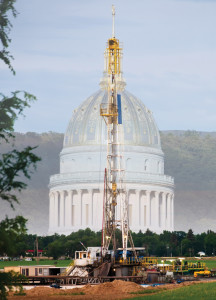Despite the state legislature’s efforts, laws in West Virginia that allow pooling exclude shallow horizontal wells. Since wells drilled in the Marcellus Shale are considered shallow, creating a shallow pooling law may be the key to maximizing the state’s shale development.
 By Anne Blankenship
By Anne Blankenship
In addition to West Virginia’s abundance of natural beauty, our state is home to a rich source of energy from natural gas in the Marcellus Shale formation. This vast source of clean energy provides us with great opportunities to improve the economic outlook for our state, region and nation. In order to promote further investment in the production of this critical natural resource, we should look at maximizing the ability to develop the Marcellus Shale in West Virginia.
Unfortunately, our state laws greatly limit the maximization of Marcellus Shale development due to a lack of a statutory pooling for shallow horizontal gas wells. In West Virginia, if an oil and gas producer is unable to obtain the permission of all interest owners of a shallow oil and gas well, even an owner of 1 percent of the tract’s mineral rights, the producer is prohibited from drilling the well. Many states, including Ohio and New York, have laws that provide a mechanism for when all of the interest owners do not grant permission for the drilling and production of a shallow well that allows for the pooling of their interests and the drilling of a well.
In the world of oil and gas, pooling refers to the combining of small tracts or portions of tracts of land for two purposes: to obtain the sufficient acreage needed in order to receive a well-drilling permit under the relevant state spacing laws and regulations and to share production by interest owners in the pooled unit. Pooling is a two-step process. First, a drilling unit must be formed, which consists of the acreage that can be efficiently drained by one well and typically includes various tracts. Once a unit is formed, the interest of consenting and non-consenting interest owners can be pooled to ensure that all interest owners receive their proportionate share of the proceeds from the well.
Laws have been in place for years in West Virginia that allow for the pooling of non-consenting interest owners for deep wells, shallow secondary oil recovery and coalbed methane wells. However, no law exists in West Virginia to allow for the pooling of interests for shallow horizontal wells when interest owners refuse to consent to the drilling and production or are unknown or cannot be found. Oil and gas wells drilled in the Marcellus Shale are considered shallow wells in West Virginia. By not having a pooling mechanism available for shallow horizontal wells, the development of the Marcellus Shale cannot be maximized in West Virginia.
The lack of a pooling statute for shallow horizontal wells in West Virginia is certainly not a reflection of a lack of effort to change the law. For years, legislation aimed at providing a mechanism to pool involuntary interests for shallow wells has been introduced in West Virginia but has failed to pass. Most recently, during the 2015 West Virginia Legislative Session, House Bill (HB) 2688 was introduced, which provided a process to form drilling units and pool the interests from those drilling units for horizontally drilled shallow wells so that those wells can be drilled and produced even if not all of the interest owners have provided consent. HB 2688 was more successful than its earlier counterparts and survived the legislative session until the 11th hour when, on the last day of the session, it surprisingly died. The endurance of HB 2688 was due, in part, to a coalition of many stakeholders that did not exist in the past, along with the strong support of Delegate Lynwood Ireland, who introduced the bill. Unfortunately, the endurance did not result in a passing bill.
It is too early to tell whether a special session will be convened to address pooling for shallow wells or whether another bill will be introduced next year. The passage of HB 2688 would have been a monumental move in the right direction for Marcellus Shale development in West Virginia and would fairly and efficiently maximize oil and gas production in the state. It is crucial that lawmakers are educated about the importance of pooling and understand its benefits for all of West Virginia, including landowners. By not maximizing the oil and natural gas in West Virginia, the wrong message is being sent to investors and may leave them wondering: Is West Virginia really open for business?








